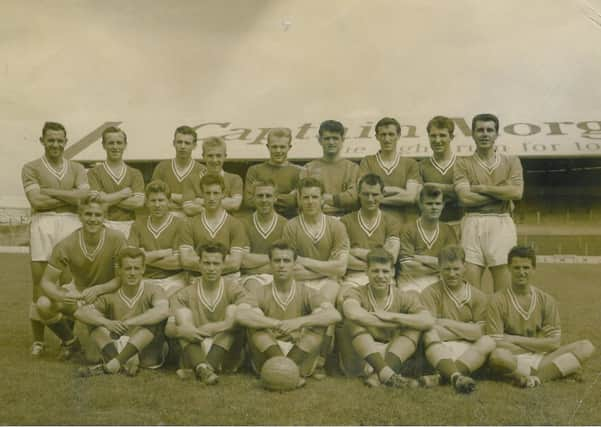Obituary: Danny Malloy, footballer


Danny Malloy was born at home in Longcroft, Stirlingshire on 6 November, 1930, one of seven children. Times were tough back then, and with the National Health Service still 18 years from existence, local companies were heavily relied upon to provide the work necessary to allow families to feed and clothe themselves and their children.
Consequently, fit and able children were encouraged to leave school at 14 and start their working lives either down the mines or in one of the local foundries or mills, whether or not they displayed any academic prowess.
Advertisement
Hide AdAdvertisement
Hide AdDespite a visit to the Malloy household from Mr Stark, the headmaster, requesting that a young Danny be allowed to continue his studies, the notion, though noble and well-intentioned, was a non-starter. The lad followed in his father’s footsteps and went to work in one of the biggest cast-iron foundries in the area, Smith & Wellstood, in the “dressing shop” as an apprentice fitter.
The war years had a profound effect on Danny, and he was often heard recalling the sounds of German bombers droning overhead on their way to blitz Clydebank in March 1941. The story went that the planes simply followed the shimmering moonlight reflecting off the Forth and Clyde canal which passed close to Danny’s home, all the way down to the other side of Glasgow.
Football had always played a big part in Danny’s life up to his mid-teens, as it did most young lads at that time, and he was never happier than when he had a ball at his feet. From a local boys’ team known as LBH (Longcroft, Banknock and Haggs), to Wellstood Juveniles, and then Camelon Juniors at aged just 16, Danny progressed well through the ranks. At that time he was tall and kind of lanky and played in a variety of positions, including on the wing and at centre-forward.
Danny’s life changed in 1948 when, after playing for Camelon in a local cup final at Brockville Park, Falkirk, a scout for Dundee FC offered him a week’s trial with the Dens Parkers.
That Dundee side had great pedigree, having only just been pipped to the First Division title the previous season by Rangers, and Danny was thrilled when he learned that manager George Anderson had been so impressed with him during the week’s trial that he’d offered to sign him straight away.
Unfortunately, national service and a posting to Salisbury scuppered any notions Danny had of breaking into the first team any time soon.
When he eventually arrived back to Dens Park Danny went straight into the reserve team. Dundee’s world-class half back line of Gallacher, Cowie and Boyd were not in the mood to be broken up. Danny would have to bide his time. He was sure he would get his chance.
That chance eventually came when Alfie Boyd left for South Africa and Doug Cowie shifted to left half. Two years and 70 odd games later, Danny’s stock had risen so much that he was being touted as the natural successor to Rangers’ George Young for the national team.
Advertisement
Hide AdAdvertisement
Hide AdDuring this spell, he pitted his wits against some of the best players in the country, including Lawrie Reilly, Willie Bauld and Billy Simpson.
Clubs such as Newcastle, Wolves and both sides of the Old Firm all looked to try and lure him away from Dens, but before any move could be made, Danny and his new wife were off to Cardiff City after the Welsh club offered a huge fee of £17,500 for his services.
The cash-strapped Dens Parkers were not in a position to turn down such an offer and the deal was done in the blink of an eye.
Danny spent six successful seasons in south Wales, gaining cult status playing against some of the greats in the game – legends such as Stanley Matthews, Tom Finney, Nat Lofthouse, John Charles, Jackie Millburn and Tommy Taylor – but he is best remembered by the Cardiff fans for captaining them back to the top flight in 1960 with a tense, hard-fought 1-0 win against title rivals, Aston Villa.
One rainy night in Middlesborough, in 1957, Danny gained dubious notoriety as the only man who could silence Brian Clough when a swinging right hook settled some on-field verbals between them during a game. Danny instantly regretted the incident, so much so that he refused to talk about it for years afterwards.
Danny left Cardiff City at the start of the 1962 season following a disagreement over wages, signing on as player/manager at unfashionable Doncaster Rovers. It was a move he later labelled as “the worst decision of my life. From going to play at Old Trafford, Stamford Bridge and Highbury, I was heading to Rochdale, Bury and Workington.”
After a stressful ten months in Yorkshire, Danny decided enough was enough, eventually heading back up the road to Scotland to sign for Clyde FC, where he played a season before calling time on his career.
The family settled in Denny, close to the village of his birth, and Danny went to work with his brother James, driving a lorry for a local roofing company until his retirement. He spent his final years in good health, enjoying his family, getting out and about in his car and walking his beloved little Scottie dog, Kirsty.
Advertisement
Hide AdAdvertisement
Hide AdThe Brian Clough altercation is described in greater detail, along with a full account of Danny Malloy’s life on and off the park in his autobiography, co-written with son, Andy, entitled Memoirs of a Hard Man – The Danny Malloy Story (published in 2013 by Vertical Editions).
Danny, who was 84, is survived by his son and daughter and seven grandchildren.
His funeral service will be held at Falkirk Crematorium at 9am on Saturday, 24 January.